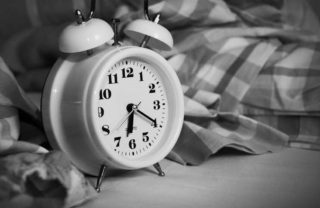Simple Strategies for a Better Night’s Sleep
Having difficulties sleeping can be one of the most frustrating struggles for one to experience. Whether it’s troubles falling asleep, waking up, or getting out of bed in the morning, issues with sleep can significantly impact other areas of our life.
Here are some tried and true tips inspired by research to help you set up an optimal sleep environment:
1. Set an alarm and wake up at the same time every day.
Although it can be tempting to base our wake up time on our schedule, our bodies can have difficulties adapting to these variations. Waking up at different times each day can induce feelings similar to jet lag, leaving you feeling tired during the day. Instead, try setting an alarm for the same time each day, even on weekends.
2. Avoid screen time before bed, and download blue-light blocking apps.
Research has shown that blue light exposure from light-emitting eReaders before bed can negatively impact our quality of sleep at night and next-morning alertness (Chang et al., 2015). Using electronics in bed before you attempt to fall asleep may also be stimulating in general, by the nature of the content you are viewing or prolonged use. To avoid electronics interfering with your sleep, commit to only using electronics outside of the bedroom environment. You can also download applications which are specifically developed to remove the blue light from your electronics corresponding with normal daytime hours. “flux” is an example of one such application, and can be downloaded from the following link: https://justgetflux.com/
3. Remove your bedroom clock or hide the display.
I cannot stress this one enough. As a self-admitted bedroom clock-watcher, I can attest to how anxiety-provoking it can be to watch the clock count down closer and closer to the alarm going off. Hours of “Okay, now I will have five hours of sleep… Now four and a half…” can further add to sleep anxiety and prolonged periods of tossing and turning. Instead, shut off your clock display, turn the clock so it is not facing you, or cover the display with a face cloth so you cannot see it.

4. Avoid caffeine and nicotine close to bed.
Any caffeinated products (including coffee, tea, and soda) should be avoided five to six hours before bed. Therefore, if you plan to go to bed at 10:00 p.m., avoid caffeine after 4:00 p.m. This ensures that the caffeine has enough time to work its way through your system (which typically takes approximately 6 hours) before you go to sleep. Similarly, nicotine should be avoided 2-3 hours before bed, as this is the time frame nicotine requires to work through your system.
5. If you can’t sleep, try getting out of bed.
If you are in bed tossing and turning for greater than twenty minutes, it may be beneficial to try to get out of bed for a brief change in environments. You may try to walk around the house, have a drink of water, or try a breathing exercise in the living room. If you are lying in bed thinking of all the things you need to do the next day, it may be helpful to go to the kitchen or living room and write a list of the things you need to do. You can leave your list on the table there and then return to bed, knowing that those to-do’s will still be there for you in the morning.
6. Increase physical activity during the day.
There is ample scientific evidence that exercise improves quality of sleep, and can also improve human sleep disorders (Sherrill et al., 1998). With direct benefits for sleep and countless benefits for other areas of our health, why not get active! Try to aim for 30 consecutive minutes of physical activity per day, through activities such as taking a class at the gym, going for a long walk, or playing with the kids.
Adapting to a new sleep routine can be frustrating, and it does take time. Be persistent with using these strategies, and you should be on the road to a restful night’s sleep!

References
Chang, A., Aeschbach, D., Duffy, J., & Czeisler, C. (2015). Evening use of light-emitting eReaders negatively affects sleep, circadian timing, and next-morning alertness. PNAS, 112(4): 1232-1237.
Sherrill, D., Kotchou, K., & Quan, S. (1998). Association of physical activity and sleep disorders. Arch Intern Med. 158(17): 1894-18

